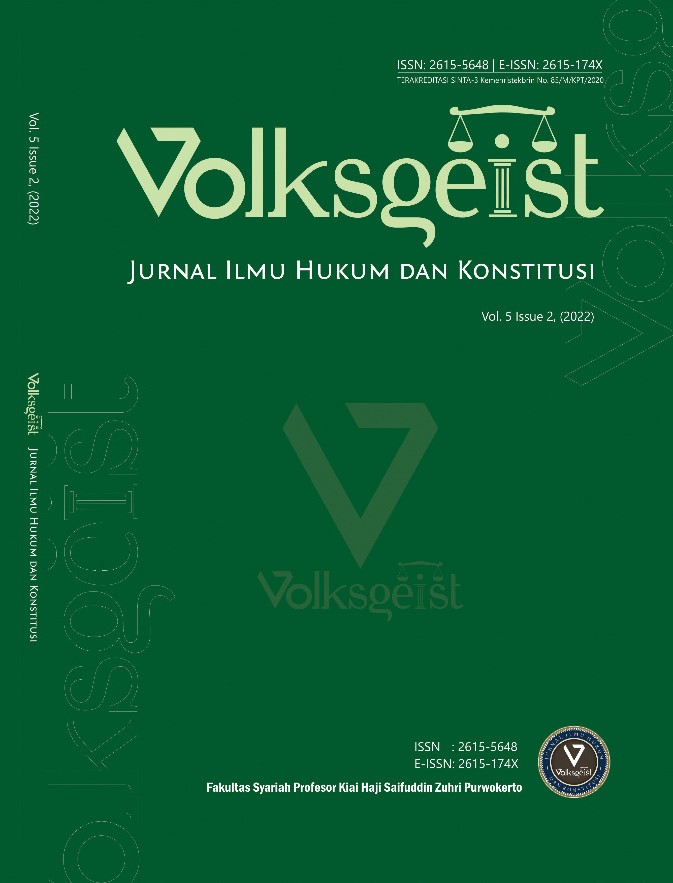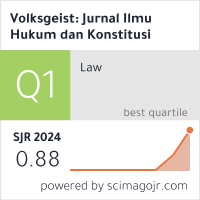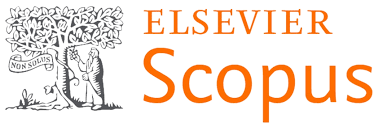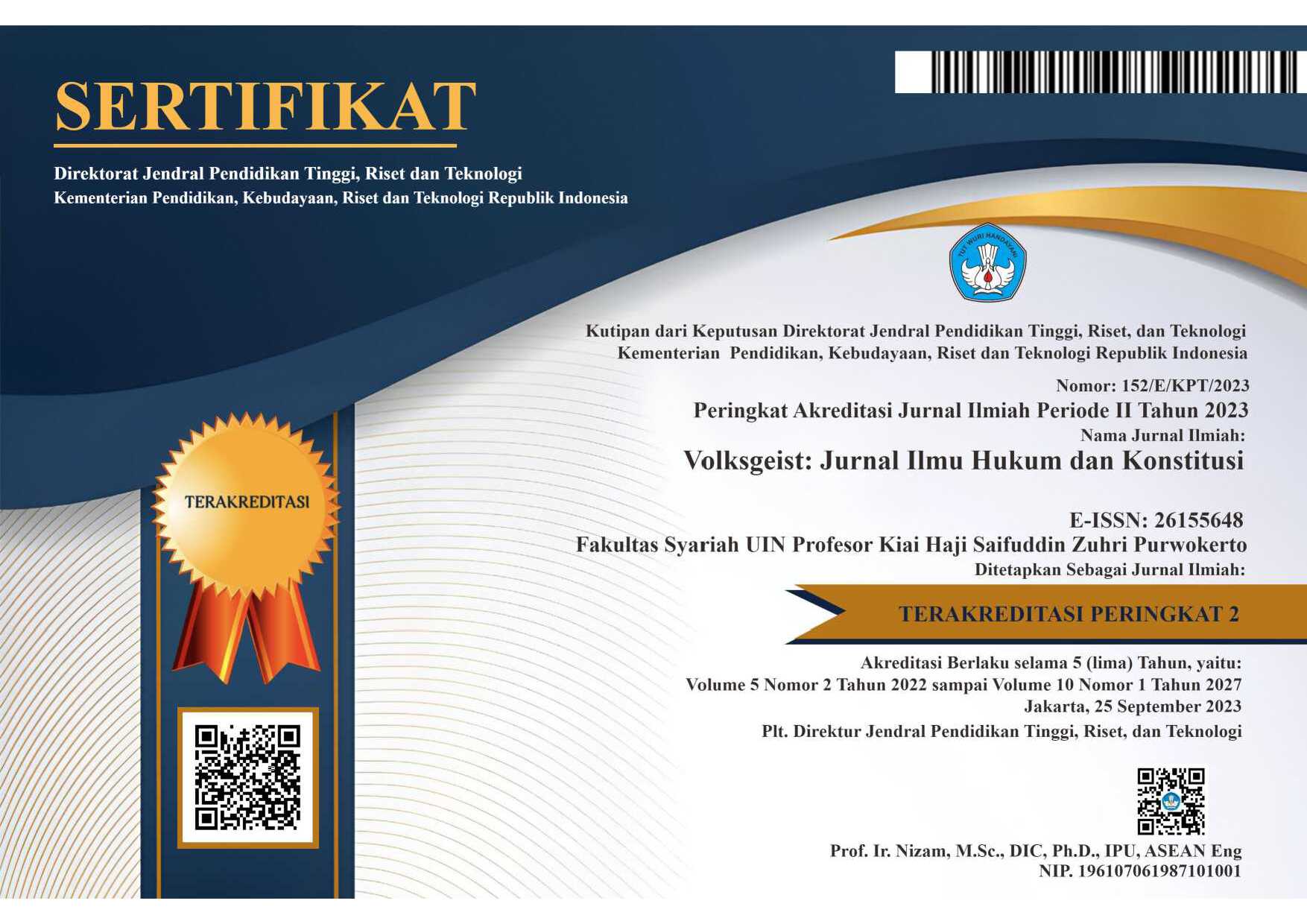Provisions of Legal Protection for Terrorism Victim in Order to Realize Constitution Order
DOI:
https://doi.org/10.24090/volksgeist.v5i2.6939Abstract
The purpose of this study is to find out how to provide legal protection for victims of terrorism crimes in order to realize constitutional orders. The type of this research is descriptive analytical. This research is carried out by examining theories, concepts, legal principles, the systematics of laws, legal comparisons and legal history, and synchronization of laws and regulations. Terrorism can happen anytime, anywhere, and happen to anyone indiscriminately. The damage caused by acts of terrorism is enormous. The rise of terror that occurred with many victims has proven that terrorism is a crime against human values. Terror has proven as a matter of fact as a tragedy over human rights. The physical impact caused by terrorism is not only on those who are targeted but also on victims who do not know and are not related to the target of the terrorist. Article 35A, paragraph 1 under Act No. 5 of 2018 stated that “Victims are state responsibility”. By the presence of state to handle terrorism’s victim, it is hoped that more targeted and equitable rights of all victims affected by an act of terrorism.Downloads
References
Hariyanto, Hariyanto. Hak Asasi Manusia Dan Hukum Pidana Islam. Yogyakarta: Mahameru Press, 2017.
———. “Pembangunan Hukum Nasional Berdasarkan Nilai-Nilai Pancasila.” Volksgeist: Jurnal Ilmu Hukum Dan Konstitusi 1, no. 1 (June 7, 2018): 53–63.
Hartini, Sri, Tedi Sudrajat, and Rahadi Wasi Bintoro. “Model Perlindungan Hukum Terhadap Kebijakan Pelayanan Kesehatan Masyarakat Miskin Di Kabupaten Banyumas.” Jurnal Dinamika Hukum 12, no. 3 (2012): 9.
Hattu, J. “Perlindungan Hukum Terhadap Korban Kejahatan Ekonomi Di Bidang Perbankan.” Jurnal Sasi 16, no. 4 (2010): 39.
Hendriana, Rani. “Perlindungan Hukum Korban Tindak Pidana Terorisme: Antara Desiderata Dan Realita.” Jurnal Kosmik Hukum 16, no. 1 (2016): 30.
———. “Perlindungan Hukum Korban Tindak Pidana Terorisme: Antara Desiderata Dan Realita.” Jurnal Kosmik Hukum 16, no. 1 (2016): 33.
Iswanto, Wahyudi. “Perlindungan Hukum Terhadap Hak Korban Terorisme.” Lex Crimen 4, no. 1 (2015): 238.
Koto, Ismail. “Kebijakan Hukum Terhadap Perbuatan Penggunan Merek Yang Sama Pada Pokoknya.” SANKSI: Seminar Nasional Hukum, Sosial Dan Ekonomi. 1, no. 1 (2022).
Mawati, Eprina, Lies Sulistiani, and Agus Takariawan. “Kebijakan Hukum Pidana Mengenai Rehabilitasi Psikososial Korban Tindak Pidana Terorisme Dalam Sistem Peradilan Pidana, Program Studi Magister Hukum Universitas Padjadjaran.” Jurnal Belo 5, no. 2 (2020): 36.
Nivada, Aryos, and Iqbal Ahmady. “Kerangka Regulasi Perlindungan Korban Tindakan Terorisme.” Jurnal Of Political Sphere 1, no. 1 (2020): 15.
Nugroho, Hibnu. “Paradigma Penegakan Hukum Indonesia Dalam Era Global.” Jurnal Pro Justicia 26, no. 4 (2008): 320.
Poldung, Muhammad, and Subekti. “Pelaksanaan Perlindungan Korban Tindak Pidana Terorisme Berdasarkan Undang-Undang Nomor 15 Tahun 2003 Tentang Penetapan Peraturan Pemerintah Pengganti Undang-Undang Nomor 1 Tahun 2002 Tentang Pemberantasan Tindak Pidana Terorisme (Studi Kasus Bom Bali).” Recidive 6, no. 3 (2017): 460.
Tauhidillah, Muh. Alfath. “Korban Sebagai Dampak Dari Tindak Pidana Terorisme: Yang Anonim Dan Terlupakan.” Jurnal Kriminologi Indonesia 5, no. 2 (2009): 19.
———. “Korban Sebagai Dampak Dari Tindak Pidana Terorisme: Yang Anonim Dan Terlupakan.” Jurnal Kriminologi Indonesia 5, no. 2 (2009): 1.
Downloads
Published
How to Cite
Issue
Section
License
Copyright (c) 2022 Ismail Koto, Taufik Hidayat Lubis, Soraya Sakinah

This work is licensed under a Creative Commons Attribution-ShareAlike 4.0 International License.
Copyright Notice
Authors who publish with this journal agree to the following terms: Authors retain copyright and grant the journal right of first publication with the work simultaneously licensed under a Creative Commons Attribution-ShareAlike 4.0 International License that allows others to share the work with an acknowledgment of the work's authorship and initial publication in this journal.











